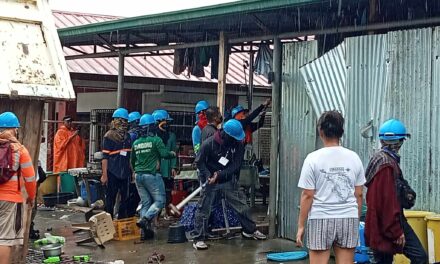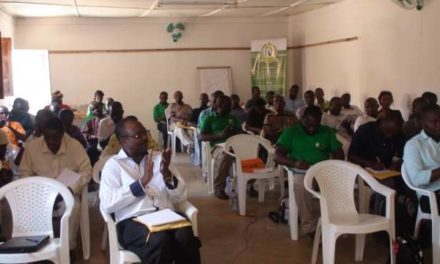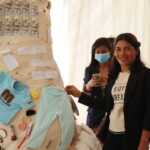Monterrey, Mexico is the venue for next week's Financing for Development Conference. Monterrey is the capital of one of the country's most prosperous states, Nuevo Leon, within spitting distance of Texas, and the sort of big open country where President Fox can try out his cowboy boots. It is also home to thousands of 'maquiladoras' which have proliferated along the US-Mexico border since the liberalisation of trade and investment under the North American Free Trade Agreement (NAFTA). The conditions in these “assembly lines” for foreign industry are notoriously bad.
The conference itself will be held at the CINTERMEX convention centre which, among other features, boasts the “NAFTA room” – a mega-conference hall seating close to 8,000 made up of three sections: Mexico, United States and Canada. Conveniently, the convention centre also houses the permanent offices of more than 150 “world class corporations.”
Across town, a civil society “Global Forum,” organised by several networks of Mexican NGOs and unions, is underway at the Fundidora Park which was, until 10 May 1986, the Monterrey Steel Mill. According to a press release on the Global Forum website, over 12,000 families were victims of exploitation at the hands of “businessmen and the neoliberal economic model” after the mill closed, a story recalled at the opening of the forum by ex-steel worker Jesus Medellin.
“Thousands of workers from the Monterrey Steel Mill, founded at the beginning of the last century, were laid off without compensation, harassed, and accused of being communist and lazy as a consequence of the privatizing processes, the corruption, and the structural and political adjustments at the service of major capital”, he said.
Medellin said he was “speaking in the memory of hundreds of workers who were scalded, electrocuted, or died in work related accidents provoked by exploitive conditions and who were never compensated by the company.”
In the name of the ex-workers Medellin supported citizens initiatives towards eradicating an economic policy that keeps 40 million Mexicans poor and invited people “to construct a system of fair social politics, without exploitation and in favor of the people, not the government.”
Unfortunately, the chances of Mr Medellin's wishes being fulfilled in Monterrey are absolutely zero.
Financing for Development – or, as Vandana Shiva calls it, financing for globalisation – is a low point for the UN and no one should be surprised that the Washington Consensus has “morphed” into the Monterrey Consensus.
The fatal flaws of FFD were evident from day one. First, the WTO, IMF and World Bank were slap bang in the middle of the process as “equal partners,” a decision endlessly justified by UN bureaucrats who argue that it's better to have them inside than outside. The warning bells should have rung even louder when, at the second prep com in February last year, the US representative to the UN insisted that the mandates of the WTO, IMF and World Bank “should be respected.” The US, he said, was “concerned that the development financing process might be used as a vehicle for the United Nations to interfere in their governance and decision-making mechanisms.” Any such attempt, he warned, would be opposed by the US.
The outcome of such a compromised process is entirely predictable and the Monterrey Consensus represents an unprecedented level of “convergence” around a blatantly neo-liberal economic model (well-padded in the language of poverty alleviation, good governance and sustainable development) and which shifts the responsibility to the South and extracts no commitments from the North. Why and how the G77 allowed the process to slip so far away from their own agenda and interests remains a mystery.
Another mystery is why “civil society” stuck to the rules of engagement. We should have denounced this process from the beginning, rather than hanging-on in the vain hope that something would come out of it. Granted, some crumbs on Tobin taxes and ODA were tossed from time to time, but they came to nothing. We have now seen the draft consensus document and it is deeply flawed. What's more, we know that regardless of what is agreed in Monterrey, the US will do what it likes. Knowing what we know, we should not be sitting at the Monterrey “Roundtables” giving credibility to this deplorable farce. Instead, we should be boycotting the whole sorry affair. How many failed UN summits will it take for us to realise that the UN is weak and compromised and is now signing off on a political document which delivers nothing on debt, nothing on redistribution and reparations, nothing on the regulation of markets and corporations and nothing for the global South.
Let's not make the same mistake in Johannesburg.
Next week, Focus on the Global South, along with colleagues in the Philippines, will be mounting a 'peace mission' to Mindanao and in this issue of Focus on Trade, Walden Bello writes about the folly of US intervention in the “cauldron of Basilan.” We will report on the mission in the next issue. Also in this issue, Shalmali Guttal blows away the smokescreen of “information disclosure,” Mark Weisbrot warns that the political backlash from squeezing Argentina too hard may be more than the IMF can handle (although, the “failure” of the IMF's recent mission to Argentina seems to give the them the upper hand in the stand-off). Finally, trade unionist and researcher Gerard Greenfield analyses the diabolical effect of Vietnam's success in the coffee market, showing the risks of putting all your eggs in the cash-crop basket and, finally, Vandana Shiva's thoughts on Financing for Development.
IN THIS ISSUE
AFGHANISTAN II OR MOGADISHU II: THE PHILIPPINES AS 'SECOND FRONT”
By Walden Bello
DISCLOSURE, OR DECEPTION? MULTILATERAL INSTITUTIONS AND ACCESS TO INFORMATION
By Shalmali Guttal
FINANCING FOR GLOBALISATION, NOT FINANCING FOR DEVELOPMENT
By Vandana Shiva
IMF PLAYING WITH FIRE IN ARGENTINA
By Mark Wesibrot
VIETNAM AND THE WORLD COFFEE CRISIS: LOCAL COFFEE RIOTS IN A GLOBAL CONTEXT
By Gerard Greenfield









